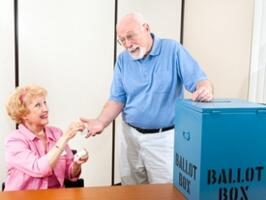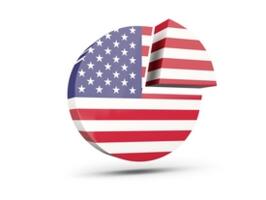Voters Don’t Trust Polls, See Anti-Trump Bias
Most voters don’t trust political polls and tend to think pollsters are out to stop President Trump’s agenda.
Just 26% of Likely U.S. Voters say they trust most political polls. The latest Rasmussen Reports national telephone and online survey finds that 55% do not trust most political polls. Nineteen percent (19%) are undecided. (To see survey question wording, click here.)
Thirty-seven percent (37%) rate the current polling on political issues and events as worse than it has been in the past. Only 11% say polling is better now. Forty-six percent (46%) think it’s about the same.
Just one-out-of-three voters (35%) believe most pollsters are interested in reporting the attitudes of Americans in an unbiased manner when they poll on Trump. Forty-three percent (43%) think most pollsters are trying to block the president from passing his agenda. Just 12% say most are trying to help the president pass that agenda instead.
Not surprisingly, given how wrong most pollsters were about the outcome of the presidential election, 64% of Republicans think most pollsters are trying to block Trump’s agenda, a view shared by 42% of unaffiliated voters but only 24% of Democrats.
(Want a free daily e-mail update? If it's in the news, it's in our polls). Rasmussen Reports updates are also available on Twitter or Facebook.
The survey of 1,000 Likely Voters was conducted on May 3-4, 2017 by Rasmussen Reports. The margin of sampling error is +/- 3 percentage points with a 95% level of confidence. Field work for all Rasmussen Reports surveys is conducted by Pulse Opinion Research, LLC. See methodology.
We told you last November that Real Clear Politics’ review of the findings of the top pollsters in the country showed that Rasmussen Reports called the 2016 presidential election right. Now another independent look at the highly criticized polling of the Trump-Clinton race, this time by the American Research Group, confirms that Rasmussen Reports was the most accurate pollster in the final survey before Election Day.
Only 25% of all voters feel the average pollster is in about the same place they are ideologically. Thirty-five percent (35%) say the average pollster is more liberal than they are, while 20% say they’re more conservative. Another 20% are not sure.
The majority of Republicans (66%) and unaffiliated voters (56%) do not trust most political polls. Democrats agree but by a much narrower 44% to 36% margin. GOP voters are far more likely than the others to consider the average pollster more liberal than they are.
Those under 40 are more trusting in political polls than their elders are and are less likely to believe most pollsters are trying to stop the president’s agenda. But even younger voters are more likely to see an anti-Trump bias than impartiality among most in the polling community.
Whites and other minority voters are more likely than blacks to feel that most pollsters are trying to block the president, although all three groups are dubious about most political polls.
Seventy-three percent (73%) of voters who Strongly Approve of the job Trump is doing say they don’t trust most political polls. Voters who Strongly Disapprove of the job the president is doing are evenly divided on this question.
Voter attitudes about pollsters parallel Rasmussen Reports’ findings over the years about the news media. Forty-four percent (44%) of all voters believe most reporters are trying to block Trump from passing his agenda. By comparison, 48% said most reporters were trying to help President Obama pass his agenda in 2010.
A plurality (44%) continues to believe the average reporter is more liberal than they are. Just 17% say that reporter is more conservative, while 24% view the average reporter as about the same as themselves ideologically. These perceptions have changed little over the years.
Some election analysts suggested last year that Trump had hidden support among voters who were unwilling to say publicly where they stood because they were fearful of criticism. Republicans were clearly less likely to let others know how they intended to vote compared to previous presidential campaigns.
Additional information from this survey and a full demographic breakdown are available to Platinum Members only.
Please sign up for the Rasmussen Reports daily e-mail update (it's free) or follow us on Twitter or Facebook. Let us keep you up to date with the latest public opinion news.
The survey of 1,000 Likely Voters was conducted on May 3-4, 2017 by Rasmussen Reports. The margin of sampling error is +/- 3 percentage points with a 95% level of confidence. Field work for all Rasmussen Reports surveys is conducted by Pulse Opinion Research, LLC. See methodology.
Rasmussen Reports is a media company specializing in the collection, publication and distribution of public opinion information.
We conduct public opinion polls on a variety of topics to inform our audience on events in the news and other topics of interest. To ensure editorial control and independence, we pay for the polls ourselves and generate revenue through the sale of subscriptions, sponsorships, and advertising. Nightly polling on politics, business and lifestyle topics provides the content to update the Rasmussen Reports web site many times each day. If it's in the news, it's in our polls. Additionally, the data drives a daily update newsletter and various media outlets across the country.
Some information, including the Rasmussen Reports daily Presidential Tracking Poll and commentaries are available for free to the general public. Subscriptions are available for $4.95 a month or 34.95 a year that provide subscribers with exclusive access to more than 20 stories per week on upcoming elections, consumer confidence, and issues that affect us all. For those who are really into the numbers, Platinum Members can review demographic crosstabs and a full history of our data.
To learn more about our methodology, click here.




